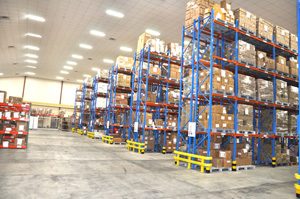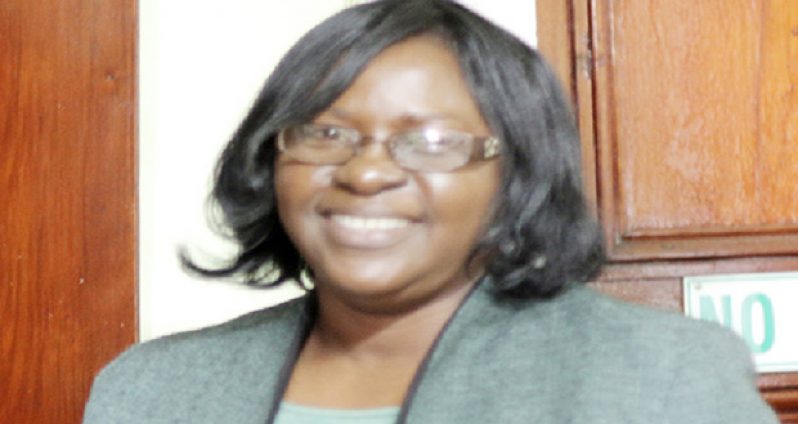SMALL bonds will be built in every region, and a computerised tracking system will be implemented to reduce the problem of far-flung regions not having access to basic supply of drugs, and in a timely manner.Minister within the Ministry of Public Health Dr Karen Cummings in an exclusive interview told the Guyana Chronicle that the Ministry is disturbed by the current system, but is moving swiftly to correct it.

“We have been working with Supply Chain Management System (SCMS), at Diamond, where they have changed their system, whereby they are going to have each region have a semi-bond or small bond,” Dr Cummings said, adding: “So, when your stock level reaches a critical level, a flag would be raised and drugs would be going there, rather than waiting for us to come all the way from Georgetown.”
The tracking of drug availability in all the regions, she said, will be done electronically. “In times past,” Dr Cummings said, “drugs did not reach the outlying regions because they were not delivered, although monies were paid in advance. I have visited the Diamond Bond, and they have a highly technological system. We are trying to improve our heath information system, so I can stay from here and look at Region 9 and see what drugs they have and don’t have. We are getting there, so, right now, we are working to have the SCMS to ensure that when drugs are short, they can report directly to Master Control, so that there would not be a case where the regions would be out of stock for long.”
The issue of shortage of drugs in outlying areas has been a matter close to Minister Cummings. In her first speech in the National Assembly in April last year, she had lamented that a basic drug like Panadol was not available in some health centres.
SOLE SOURCING
The Minister blames the at times late supply of drugs on sole sourcing, pointing out that the producer, the New Guyana Pharmaceutical Company (NEW GPC) is often paid up front, but the goods are not always delivered on time.
Dr Cummings noted that there might be genuine reasons for the delay, but conceded that at the end of the day, ordinary persons who are entitled to basic treatment are denied timely services provided by the State.
Coupled with late supply is the time it takes to get the drugs into the outlying regions, which require both land and river transportation.
Dr Cummings said there is little the Government can do when it makes a purchase, and supplies are not delivered on time.
According to the Minister, there are also instances when the drugs are supplied, the remaining shelf-life is short. This, Dr Cummings said is a waste of taxpayers’ money.
The Minister told this publication that she will have no grouse with sole sourcing if it is being properly managed by the producer, and drugs are routinely delivered on time.
Dr Cummings is of the view that multi-sourcing would be the answer to the problem, since it would not be too prudent to rely on one supplier, and when he fails to deliver on time, things come to a standstill.
OTHERS SHOULD BENEFIT
“Like anything,” she said, “we want other people to be part of the pie; you wouldn’t want one person to enjoy everything. You have IPA and others who are suppliers, and they, too, have to survive.”
The NEW GPC had explained that the then Ministry of Health and the Georgetown Public Hospital Corporation (GPHC) procure medicines and medical supplies through two mechanisms.
Medicines and certain medical supplies are procured through a list of prequalified suppliers. This list of prequalified suppliers has been determined after an open tender process, using public tendering modelled after a World Health Organisation (WHO) model and recommended specifically by the World Bank.
The company said certain specialised medicines, laboratory supplies and medical supplies are procured through regular, open tender as the need arises. It also noted that following the recommendation of the Auditor General in 2010, medicines and certain medical supplies began to be procured through a list of prequalified suppliers.

And between 2011 and 2013, four international entities, namely the Pan-American Health Organisation/World Health Organisation (PAHO/WHO), the United Nations Children’s Fund (UNICEF), the United Nations Population Fund (UNFPA), the United Nations Development Programme (UNDP), International Dispensary Association (IDA) and two local ones, MediPharm and NEW GPC, were prequalified under the stated criteria.
The company had also pointed out that for the years 2014-2016, there has been an advertisement soliciting suppliers from Guyana and members of Caricom to be prequalified and be added to the list of international suppliers. Seven companies applied, and the NEW GPC was the only one that fulfilled the publicly stated criteria according to WHO and Good Manufacturing Practices (GMP) standards.
COURT CHALLENGE
But the International Pharmaceutical Agency Guyana Limited (IPA) has since challenged the prequalification process for the supply of drugs to the health sector, saying that it is unconstitutional. The IPA has contended that the decision that it does not meet the criteria to supply drugs to the Government for 2014 to 2016 by the National Procurement and Tender Administration Board (NPTAB) is unfair, unlawful, and null and void.
The revised evaluation criteria for prequalification for the supply and delivery of pharmaceutical drugs and medical supplies for the period 2014 to 2016 the IPA believes are heavily weighted in favour of the NEW GPC. This, it said, has rendered the prequalification process unfair and unreasonable.
This matter aside, Dr Cummings said the Ministry of Public Health will also be paying strong attention to the quality of drugs on the market.
She said from feedback from medical outreaches, persons have complained that drugs supplied here do not have the potency as the ones from overseas.
The Minster told this publication that the Ministry will be working more closely with the Food and Drug Analyst Department, the National Bureau of Standards, and other agencies to ensure consumers get their money’s worth when they purchase drugs on the local market.




.png)









